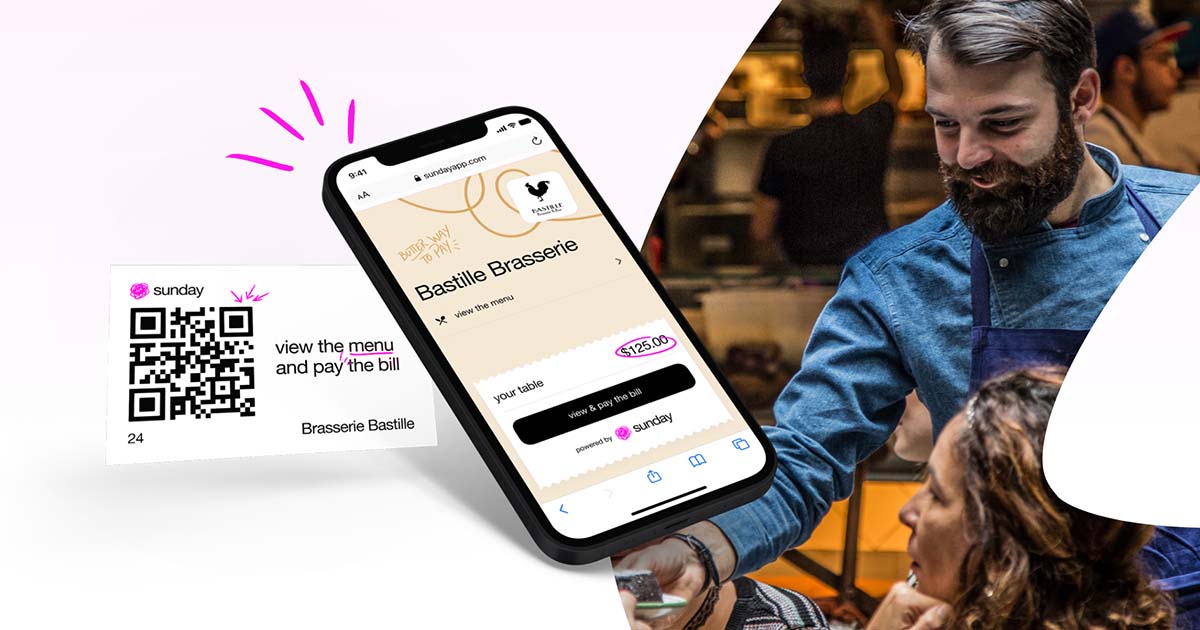Meet the $124 Million Food Tech Startup That Is Changing the Service Industry
The Origin Story of Food Tech Startup sunday

Last Updated: By TRUiC Team
Every once in a while, an ingenious startup founder comes up with a new idea in an already seemingly saturated industry. These are markets where everything has “already been done before” — that is, until a new innovation disrupts the status quo.
Such is the story of Sunday, a food tech startup that aims to disrupt the entire payment industry, starting with restaurants and hotels.
Christine de Wendel, Victor Lugger, and Tigrane Seydoux started Sunday in 2021 in Atlanta, Georgia, and have rapidly expanded into the hospitality and restaurant industries.
At its core, Sunday is a fully integrated product built for cafes, bars, pubs, restaurants, and hotels, allowing customers to pay for their food with a QR code. In this origin story, we’re going to look at the story of Sunday, how the original idea for the startup was developed, and how Sunday was able to grow into the size it is today.
This is a startup story that illustrates the fact that discipline, consistency, and determination are critical if a founder wants to enact true change and innovate in their space. Let’s dive into their and how the founders were able to get their startup Sunday off the ground.
Origin of the Startup Idea
It was early 2021, and the COVID-19 pandemic was raging around the world, causing chaos and disorder in restaurants and hospitality businesses around the world. Restaurants were establishing social distancing standards, and it was time to change their regular methods of operation.
In order to adapt to this rapidly changing environment, the founders developed a way for customers to pay their restaurant bills through a simple QR code rather than exchanging payment methods with a waiter or waitress.
They began placing QR codes on restaurant tables, allowing patrons to pay for their food. As they continued doing this, they noticed the adoption rate was tremendously high, and it only made sense to turn this into a real business.
From this seed of an idea, Sunday was born.
Instead of taking a tedious 15 minutes to pay for your food, patrons could scan a QR code and checkout in less than 10 seconds. Using the Sunday app, all you would have to do is scan a QR code, pay, and walk away.
Restaurateurs could now focus on what matters most to their business, such as cooking incredible food, delivering unforgettable guest experiences, and continuing to grow their business.
The founder’s idea for Sunday was to focus exclusively on simplicity, trust, and “going beyond.” They wanted to build a simple solution that disrupted the food industry, be transparent and accountable in how they conduct their business, and be boldly driven by fearlessness no matter the obstacles.
Sunday has now taken off in the food industry and is used by restaurants, cafes, and hotels everywhere. Paying for your food, which used to be a tedious process, has been simplified and condensed into a process that only takes a few seconds.
This is how the idea for Sunday was born. The startup founder’s early decisions allowed the business to begin attracting customers and continuously growing.
Development of Startup
After the initial startup idea for Sunday was developed, the Sunday team jumped right into growing the business and doing what it took to acquire a solid base of customers.
This involved recruiting a team of employees who could help Sunday with their vision and believed in their end goal. While interviewing potential employees, their goal was always to find people who were passionate about hospitality and wanted to make a true difference in the world. The ideal candidate would have experience scaling a startup and be willing to do what it takes to serve others.
In order to kick off its growth, Sunday received a Series A funding round from DST Global, Coatue, and New Wave.
Today, the company has grown to over 370 employees, including the three co-founders and a CTO. Without a talented team that had a vision for making Sunday the company it is today, this type of rapid growth would have been substantially more difficult to achieve.
To grow their customer base, they focused on marketing to small and medium-sized restaurants. The initial goal was to take advantage of a shorter sales cycle (smaller restaurants were most likely to agree to use their QR code service) and to talk to decision-makers as quickly as possible.
They focused on identifying “local heroes” in each market, knowing that when a major restaurant or hotel adopted their QR system, they would get more business from referrals and word of mouth.
Today, Sunday has signed more than 3,000 restaurants that currently use their service and have started to focus on enterprise and mid-market brands in order to spur widespread adoption.
What’s Next for the Startup
The Sunday founders have always had ambitious goals for their startup and aim to disrupt the entire payments industry, beginning with restaurants and hotels.
As Sunday continues establishing itself as the “go-to” QR code payment platform, the founder’s vision is to let the company move into retail and provide customers all over the world with a new, faster way to pay for their purchases.
In order to continue growing its base of customers, Sunday is beginning to shift more outreach and marketing focus to mid-market and enterprise businesses. Acquiring these large clients will allow them to quickly scale their QR code service into a large number of restaurant and hotel locations.
Overall, Sunday is a story of innovation coming from a difficult and seemingly impossible situation. The founders adapted, discovered a solution, and then built a service that businesses all over the world could use to speed up their payment process.
Recommended:
- Check out sunday’s company profile, their insights for aspiring entrepreneurs, and ways to support them!
- Hear startup stories from real founders on the Startup Savants podcast.
- Keep up with more startup companies by visiting our list of the top startups to watch.
- Form your own startup by reading our review of the best online incorporation services.
Tell Us Your Startup Story
Are you a startup founder and want to share your entrepreneurial journey withh our readers? Click below to contact us today!


